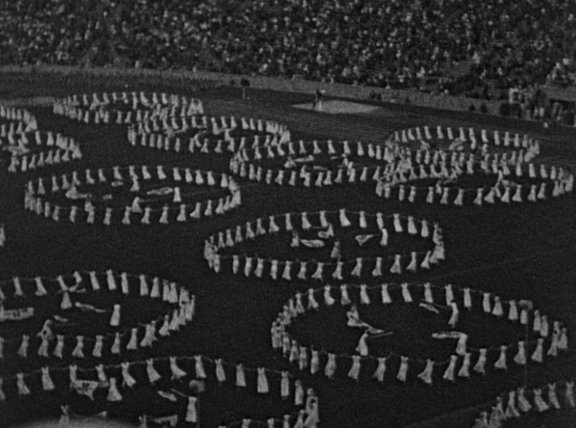29.09.23 — 20:00
Les Jeux d’Hitler, Berlin 1936
Jérôme Prieur (2016)
with a voice-over by Denis Podalydès
Looking at the images shot only eighty years ago during the 1936 Olympics, you’d almost forget they were filmed in Nazi Germany. Jesse Owens’ triumph, as he won four gold medals in Berlin (100meters, 200m, 4x100metres and long jump) seems to be a testimony to the victory of athleticism and Olympic ideals, as if the young American black athlete had been our champion, and he’d managed to defeat the Nazi monster through sports. Owens’ magnificent exploit is undeniable, but this beautiful story we’d like to believe is just an arrangement with reality, a nice fiction in which sports are just an alibi.
It had been decided before his ascent to power that the Olympics would be held in Berlin, but Hitler saw how deci-sive this global event could be to help him and the National-Socialist party get control over German society while offering a grandiose performance to promote Nazi Germany on a global scale.
Jérôme Prieur’s film narrates this gigantic propaganda operation that started as early as 1933. For the first time, combining official news footage, images extracted from Leni Riefenstahl’s Olympia and never-before seen amateur footage the film showcases the preparation, orchestration and staging of a performance that in the end was less about sports than it was about politics, and shows the 1936 Games as a game of appearances.
Olympia : Les Jeux olympiques de Berlin, 2e partie
Leni Riefenstahl (1938)
In the summer of 1936, the Berlin Olympics gave the world the image of a sporty, pacifist and regenerated Germany. Cinema was a major instrument of propaganda for the Nazi regime; Adolf Hitler understood how he could benefit from these two weeks of competition and use them to appear as an apostle for peace; he commissioned a new film to Leni Riefenstahl, who’d already produced a film for the Nazi regime. The film was meant to materialize, preserve and promote these Olympics as a success for the regime. The budget was huge, and the director used a team of over 300 people (among whom 40 cameramen), pioneering new techniques, experimenting with new types of shots and angles, while the capital of the Reich was turned into a splendid example of National-Socialism. The film was screened on April 20, 1938, on the day of Hitler’s birthday, at the UFA-Palast am Zoo in Berlin, and was extremely well-received. That same year, in August, it was awarded the Golden Lion in the Venice Mostra.
In the 1960’s, this propaganda film was revisited for its aesthetic and technical qualities; because of its innovations and the way the athletes’ performances are filmed, the film is considered as a pioneering documentary announcing today’s sports broadcasts.
In Les Jeux olympiques. D’Athènes à Athènes – 1896-2004 (2003), Olivier Joyard rigorously analyses its discourse and purpose: “the images of the film, as visually perfect as they are, are more than just an immediate propaganda tool; it’s more pernicious than this. By their timeless power of seduction, they show human bodies as perfect shapes, defined by their attitudes and identity-defining attributes, not by their capacity to exist as individuals. Eugenics are what Olympia is really about. The athleticism in it is nothing but a virtuoso dance around which a collective ritual of adoration is constructed. It’s just an instrument to promote an ideal of masculinity and society whose horrible consequences we sadly know all too well.”
This historical document which marked the advent of sports documentaries was also one of the most famous pieces commissioned by the Nazi regime. Its screening poses the question of film as archive and its legibility.
